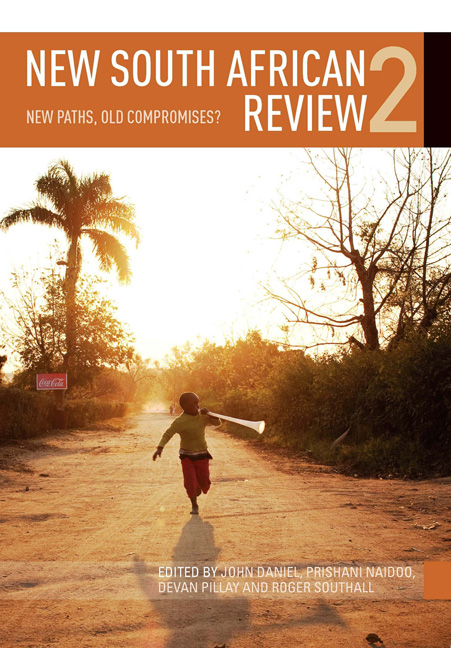Book contents
- Frontmatter
- Contents
- Preface
- Introduction: New paths, old (com)promises?
- PART 1 POLITICS AND INTERNATIONAL
- Introduction: The Zuma presidency: The politics of paralysis?
- Chapter 1 The Tripartite Alliance and its discontents: Contesting the ‘National Democratic Revolution’ in the Zuma era
- Chapter 2 The African National Congress and the Zanufication debate
- Chapter 3 Dancing like a monkey: The Democratic Alliance and opposition politics in South Africa
- Chapter 4 Democracy and accountability: Quo Vadis South Africa?
- Chapter 5 Civil society and participatory policy making in South Africa: Gaps and opportunities
- Chapter 6 Bring back Kaiser Matanzima? Communal land, traditional leaders and the politics of nostalgia
- Chapter 7 South Africa and ‘Southern Africa’: What relationship in 2011?
- PART 2 ECONOMY AND SOCIETY
- PART 3 ENVIRONMENT
- PART 4 MEDIA
- Contributors
- Index
Chapter 2 - The African National Congress and the Zanufication debate
from PART 1 - POLITICS AND INTERNATIONAL
Published online by Cambridge University Press: 23 March 2018
- Frontmatter
- Contents
- Preface
- Introduction: New paths, old (com)promises?
- PART 1 POLITICS AND INTERNATIONAL
- Introduction: The Zuma presidency: The politics of paralysis?
- Chapter 1 The Tripartite Alliance and its discontents: Contesting the ‘National Democratic Revolution’ in the Zuma era
- Chapter 2 The African National Congress and the Zanufication debate
- Chapter 3 Dancing like a monkey: The Democratic Alliance and opposition politics in South Africa
- Chapter 4 Democracy and accountability: Quo Vadis South Africa?
- Chapter 5 Civil society and participatory policy making in South Africa: Gaps and opportunities
- Chapter 6 Bring back Kaiser Matanzima? Communal land, traditional leaders and the politics of nostalgia
- Chapter 7 South Africa and ‘Southern Africa’: What relationship in 2011?
- PART 2 ECONOMY AND SOCIETY
- PART 3 ENVIRONMENT
- PART 4 MEDIA
- Contributors
- Index
Summary
The unappealing prospect of the Zanufication of the African National Congress (ANC), and by extension of South Africa, has generated considerable discussion in recent years, at both the academic and media levels, as well as having featured in elite discourse within the ANC itself. The term was first used in 2002 by Jeremy Cronin (2008a), then deputy general secretary of the South African Communist Party (SACP) – an organisation in alliance with the ANC – and a strong supporter of Jacob Zuma in his ultimately successful campaign to wrest the ANC presidency from Thabo Mbeki at Polokwane in December 2007. Cronin was subsequently forced by the ANC to apologise for his use of the term and branded, by unattributable ANC sources, a ‘frustrated white male who could not come to terms with the loss of white privilege’ (Lotshwao, 2009: 906; Suttner, 2008: 136–7). The term has subsequently, however, become more widely popularised in response to the implosion of neighbouring Zimbabwe and the ANC government's ineffectual response to that crisis. It has also served to reflect a mood of pessimism about the direction of the new South Africa.
Although there is no consensus as to the precise meaning of the term, we consider Zanufication to be defined by the following features:
• a conflation of ruling party and state;
• control of the media by the state;
• a tendency to substitute the formal and informal use of violence for the rule of law;
• the prevalence of corruption in state organs;
• the militarisation of society;
• racial demagoguery and a pseudo-militant rhetoric often serving as a smokescreen for rampant private accumulation;
• a personality cult in political leadership.
In April 2010, the British journalist Fred Bridgland posed the question: ‘Is South Africa turning into Zimbabwe?’ He pointed to certain factors which he suggested could create the conditions for Zanufication: corruption, the hubris of the dominant party, declining socio-economic performance, and an increasingly racialised rhetoric.
- Type
- Chapter
- Information
- New South African Review 2New paths, old compromises?, pp. 50 - 67Publisher: Wits University PressPrint publication year: 2012



